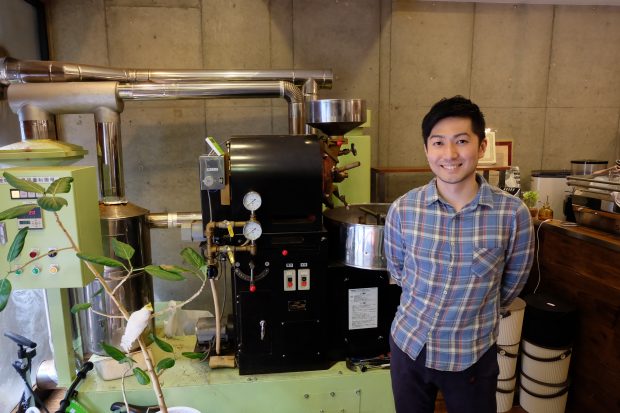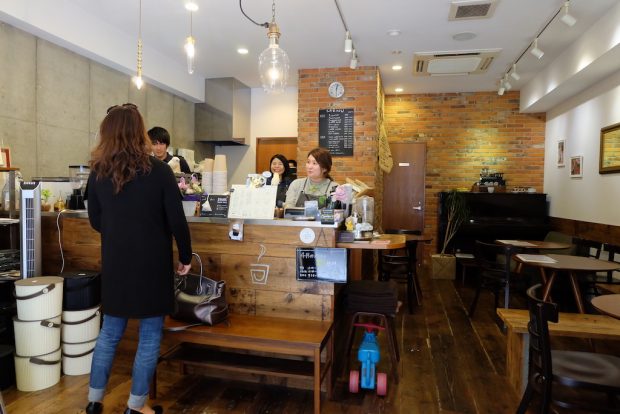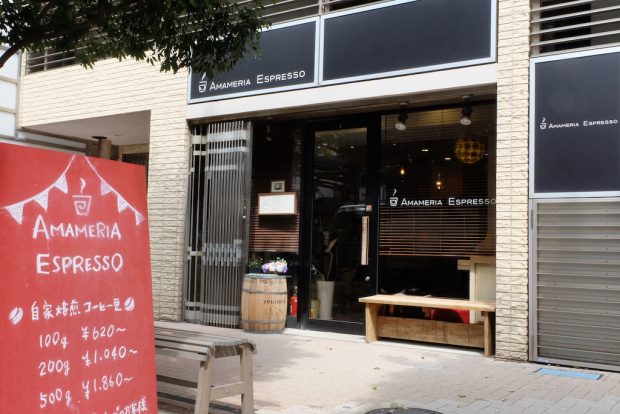Ishii Toshiaki of Amameria Espresso is a relative veteran within Tokyo’s young specialty coffee scene. He has been doing hands-on coffee work since 2002, driven by an intense curiosity about the science of the bean.
A roastery and retail bar, Amameria Espresso was opened by Toshiaki in 2010 and features a warmer decor made up of dark woods, red brick walls, and functional furniture, while many of the newer Tokyo cafés that have opened since then have followed a trend of minimalist and industrial designs. In the Shinagawa-ku ward, the café is typically filled with locals of various ages, with a smell of fresh roasted coffee filling the air.
How did you get into coffee?
When I was very young my parents ran a kissaten (a Japanese-style coffeehouse). They had closed it by the time I was three or so, but there was always coffee around. I must have started drinking black coffee when I was four, so I’ve always been interested in it. I got a job at an office espresso bar back in 2002. The first time I touched the espresso machine I pulled an amazing shot. I had never had anything like it. I was moved. Then I tried again and it was a complete failure. I realized how little I knew about coffee, how volatile it is, and sort of began obsessing over the finer details of coffee preparation since then.
What is your favorite thing about coffee?
I love how mysterious coffee is. I love digging into the mystery. Bit by bit I understand more about a bean and its flavors, about how to properly roast it, how to properly extract coffee from it. I love the science behind coffee. I’m a bit of a fanatic when it comes to that stuff, but I hide it. I want to keep the cafe laid back and welcoming. I try to keep the obsessive stuff behind the scenes.
Why did you decide to start your own cafe?
I had been working in coffee for a while before I started roasting. After roasting for around three years, I had developed my own style. I wanted to make coffee my way and to roast my way, I couldn’t do that at someone else’s cafe. I also wanted to sell beans as well as drinks, to make high quality coffee available to more people.
What’s the philosophy behind your coffee?
I think of coffee as something with its own flavors. Each bean from each origin is different. I aim to bring out those flavors and the sweetness of the coffee. More than anything I want people to taste the coffee and not the roast. Too dark, it’s smoky. Too light, it’s grassy. There’s a sweet spot in the middle that I’m aiming for.
When you started roasting, dark roast was still very popular. Did something influence you to go lighter?
I went to see the World Barista Championships in London back in 2010. I met that year’s champion, Michael Phillips, and he gave me three kilograms of coffee after winning. He said something like, “I’m done with this now, do you want it?” So, I really got familiar with some of the best coffee on the planet. I could see that coffee was going lighter while at the WBC, and basically I want Japanese coffee’s quality to be on par with the rest of the world. I’ve gotten a lot of coffee from all over the world from travelers as gifts since opening here. So, I get to see where the industry is going. Still, I don’t roast overly light. Like I said, I’m trying to find the sweet spot in the middle.
What are you currently roasting on?
I roast on a refurbished four kilogram Lucky Roaster. It gets the job done, but I need to think about moving to a bigger machine. I need to find a bigger roasting space first, since I currently roast in-shop. I’m considering going with a Smart Roaster due to the consistency of the roast it delivers.
Where do you see the coffee scene going in Tokyo?
Well, people need coffee, so the industry will continue to develop. But the trend of coffee being fashionable will probably fade. The shops that are more about being trendy than serving quality coffee will likely close. There’s also a lot of investment into the cafe industry right now, so those big business interests in financing cafes may also fade in time. The cafes that respect their customers will remain. Customers let us work, let us live. They support us. People should remember that.
Any other cafes you recommend?
Amameria Espresso is located at 3-6-15 Koyama, Shinagawa-ku, Tokyo
(note: parts of this interview have been paraphrased. The interview was conducted in Japanese and was adapted to English by the author.)
Eric Tessier
Eric Steven Tessier is a writer and coffee lover. He is based in Tokyo, Japan.









Comment